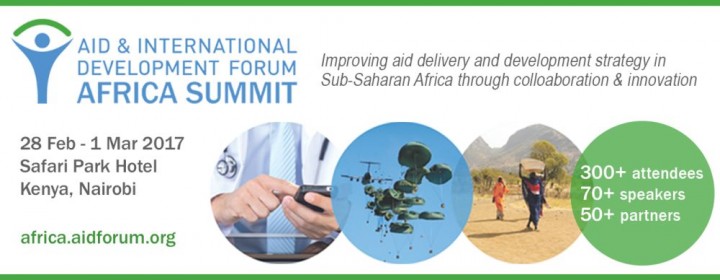The Aid and International Development Forum (AIDF) is set to hold its 2nd annual Aid & Development Africa Summit in Nairobi, Kenya on 28 February - 1 March 2017.
The 2-day Summit, which will take place at Nairobi’s Safari Park Hotel, will bring together 300+ high level stakeholders from UN and government agencies, national and international NGOs, development banks and donors, investors and the private sector to discuss how technological innovations and best practice can improve aid delivery and development strategy in East Africa.

Further Description / Program
More than 300 high-profile representatives from NGOs, businesses, government and UN organisations are set to convene at the Aid & Development Africa Summit in Nairobi this February exchanging innovative and sustainable solutions for improving aid delivery and development strategy in sub-Saharan East Africa.
Delivering Sustainable Development Goals (SDGs) requires a clear shared vision that brings together key stakeholders and actors involved in the aid and development sectors in the region. Despite promising advances, hunger, poverty, malnutrition, disease, low agricultural productivity and social inequity are still among the notable challenges particularly facing Africa.
Communicable diseases, such as malaria, HIV/AIDS and Tuberculosis (TB), remain a major public health challenge in the African region, causing a significant burden of illness, disability and mortality. While only housing 11% of the world’s population, Africa is home to 60% of people with HIV/AIDS. The region also carries a disproportionately high share of the global malaria burden. Last year 88% of global cases and 90% of global deaths occurred in Sub-Saharan Africa.
Contributing to the problem is the frequent occurrence of epidemic outbreaks driven by weak public health systems, inadequate water and sanitation services, natural disasters or civil unrest leading to the displacement of populations, overcrowding and poor environmental conditions favouring disease transmission. In sub-Saharan Africa, there are 319 million people without access to improved drinking water sources and only 30% of the region has access to sanitation facilities. While out of 574 disasters reported in 2015, 20% have occurred in Africa affecting more than 31 million people.
Innovations and developments in health & WASH, emergency response, humanitarian logistics and agriculture are fundamental for the successful achievement of the SDGs in the region. In response, the Aid & International Development Forum (AIDF) is hosting the 2nd annual Aid & Development Africa Summit on the 28th February and 1st March 2017. Over 300 key practitioners will meet in Nairobi to discuss challenges and opportunities surrounding aid delivery and development strategy in sub-Saharan Africa and showcase innovations in the sector. High-level delegates include business leaders, sector experts, investors, government ministers and representatives from NGOs and UN bodies.
Day one of the summit focuses on mobile technology innovations to support community resilience, discussing emergency communication, disaster preparedness,
cash-based programmes and improving livelihoods and safety of displaced people, with a keynote address by Sammy Itemere, Principal Secretary, Ministry of Information, Communications & Technology, Kenya.
Day two will commence with an opening speech by Dr Olawale Maiyegun, Director of Social Affairs at the African Union and proceed with a panel on innovations and reforms to support health SDGs and community health resilience.
Strengthening health programmes through the use of mobile technologies and an overview of current health threats in the region will be discussed by Peter Mwarogo, Country Director, Kenya, FHI 360 and Peter Vowles, Country Director, Department for International Development (DFID). Professor Yoswa Dambisya, Director General, East, Central and Southern Africa Health Community (ECSA-HC), Engida Mandefro, Deputy Secretary General of Programs, Ethiopian Red Cross Society and Dr Deepa Pindolia, Senior Technical Advisor, Clinton Access Initiative (CHAI) will debate how to build Africa’s capacity to meet health SDGs and deal with public health threats, explore latest medical innovations and future outlook.
Tackling communicable diseases in sub-Saharan Africa is the focus of the panel led by Miriam Maluwa, Country Director, Ethiopia, UNAIDS. Rosemary Mbaluka-Kilonzo, Assistant Country Director at CARE Kenya, Michela Martini, Regional Migration Health Specialist at International Organization for Migration (IOM) and Dr Jean-thomas Nouboussi, Senior Fund Portfolio Manager, Western at The Global Fund will provide an update on regional health programmes, disease prevention and control programmes, including vaccinations, testing, monitoring and rapid testing solutions. Special focus will be given to improving access to HIV/AIDS prevention and scaling up HIV treatment and care.
Furthermore, Dr Azmach Gebregiorgis, National Program Officer at World Health Organization (WHO) will join a panel on improving maternal and child health, sharing an update on regional maternal and child health initiatives and collaborations.
Gift Malunga, Deputy Representative at UNFPA, Samuel Norgah, Deputy Country Director, Kenya, Plan International and Dr Ann Musuva, Maternal and Child Health, PS Kenya will address sexual and reproductive health and how to best overcome challenges of child and maternal health in remote areas and temporary settlements.
The Aid & Development Africa Summit 2017 is a platform for knowledge exchange and cross-sector engagement based on structured networking and interactive debates that influence regional development and humanitarian goals in Sub-Saharan East Africa.
For all enquiries, please get in touch with Alina O’Keeffe at marketing@aidforum.org
Links to external websites
Download further information
Uploaded by:
SuSanA Admin (susanaadmin)















